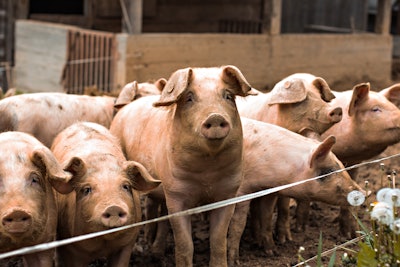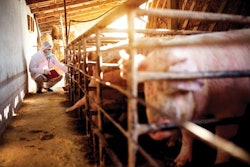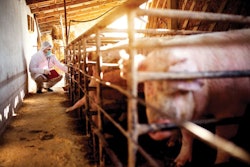
As African swine fever (ASF) re-emerged in northeast India after a prolonged hiatus, Sri Lankan authorities declare the disease situation there to be under close to complete control.
In the disputed territory of Arunachal Pradesh, cause of recent deaths among domestic pigs has been confirmed as ASF.
An unreported number of pigs died at a village in the Longding district in early June, according to Arunachal24. Investigations have revealed the presence of the ASF virus.
At the time of the sudden mortalities, a range of measures were introduced to halt the spread of any possible infection. These included a ban on the movement of pigs, increased surveillance and monitoring, and regulations on the safe disposal of swine carcasses, as well as advice to pig owners to report to officials any signs of illness or unexplained deaths of their animals.
Arunachal Pradesh is a disputed territory, according to the United Nation’s Food and Agriculture Organization (FAO). The most northeastern Indian state, Arunachal Pradesh is also claimed as part of China’s Tibetan Autonomous Region.
As of mid-May, FAO reported that ASF outbreaks had occurred in eight districts of Arunachal Pradesh since April 2020.
Worst period for ASF-related losses in the territory was 2022, when mortalities and culls reached almost 10,000. However, no cases were reported to FAO more recently.
The neighboring Indian state of Assam has experienced a series of ASF outbreaks in 2024 and 2025.
In order to bring the infection under control, a series of restrictions have been imposed across the state, including a ban on the movement of pigs across Assam’s boundaries.
On the Assam-West Bengal border, a train was halted recently after more than 100 pigs were found by officials in one coach. India Today NE reported that the veterinarians who authorized the transport have been suspended.
The finding also triggered protests from Assam’s pig farmers, who called on the authorities to carry out more such inspections for illegal shipments of animals.
ASF developments elsewhere in Asia
The Department of Animal Production in Sri Lanka has declared the ASF situation is 95% under control, reported Daily Mirror last week.
Approximately 67,000 domestic swine and wild pigs have been affected by the disease, according to the department head, and continuous vigilance is still needed to prevent a resurgence.
First cases of the disease in the South Asian island state were confirmed in October 2024 in Western Province. Subsequently, the virus spread to Uva and the Northern and Northwestern Provinces.
Latest information on the ASF situation in Vietnam puts the number of ASF outbreaks at 216 since the start of 2025.
Directly affected have been more than 8,600 pigs in 34 provinces, according to official figures to June 4 reported by Thuong Hieu & Cong Luan. In 17 provinces, ASF outbreaks had been recorded within the previous 21 days.
Estonia records first ASF cases in domestic pigs this year
The Baltic state’s animal health agency has registered the first ASF outbreak of 2025 on a commercial farm.
According to the official notification to the World Organisation for Animal Health (WOAH), a small number of the 2,776 swine died at the end of June. Cause of the mortality was confirmed as ASF. The premises was located in Viljandi, a county in the southwest of Estonia, which shares a border with Latvia.
Although there have been recent ASF cases in Estonian wild boar — including 37 so far this year — this is the first to involve the nation’s domestic pigs since July 2023.
Since the end of June, four ASF outbreaks in Croatia have been reported to WOAH. All the affected premises are described as farms, and are located in the northeastern county of Vukovar-Srijem.
This latest outbreak brings to 12 the number of European countries registering ASF cases in domestic swine in 2025, according to the Animal Disease Information System from the European Commission (EC; as of July 2). The system monitors listed animal diseases in European Union member states and selected adjacent countries.
Total outbreaks in this population have reached 270. Of these, 180 have involved Romanian herds.
This figure includes 18 outbreaks confirmed during the previous seven days — 12 in Romania, two in Serbia, and one in each of Estonia, Greece, Latvia and Poland.
During the whole of 2024, 764 outbreaks were registered with the source by 16 states.
European wild boar outbreak total approaches 7,000
In this population, 18 countries have logged a total of 6,951 ASF outbreaks with the EC System (as of July 2).
For comparison, 21 states recorded a total of 7,892 ASF outbreaks in wild boar with the EC’s database last year.
The latest figure increased by 111 compared with the update released one week previously. Among these recent cases were 39 in Poland, 29 in Germany and 17 in Latvia.
The Czech Republic (Czechia) is the latest country in the region to record ASF in its wild population this year.
After a hiatus, one of two carcasses found in the northern region of Liberec in June tested positive for the virus, reported the state veterinary service. The discovery – in a zone with ongoing restrictions after previous cases in wild boar in this region – was in the remains of an animal thought to have died 10 months previously. It is the first recorded detection of the ASF virus in the country for the same period.
At 2,389 to date in 2025, Poland’s total for wild boar cases is the highest in the region, according to the EC system, followed by Germany (1,621) and Latvia (653).
In mid-June, North Rhine-Westphalia became the sixth state in Germany to detect the presence of the ASF virus. Its first case was in a wild boar found in the district of Olpe.
Last week, the government of this west German state reported that an infected wild boar carcass had been discovered outside Olpe. It was found in the adjacent district of Siegen-Wittgenstein, in an area already included in the control area set up after the previous case.
There is wide variation in how different countries carry out surveillance for animal diseases, such as ASF, according to a recently published study.
View our continuing coverage of the global African swine fever situation.

















